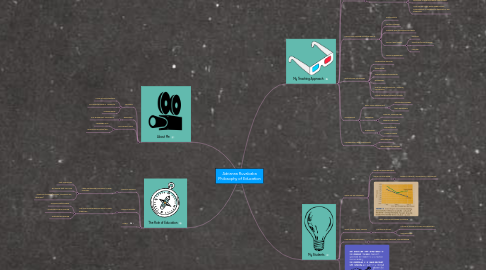
1. About Me
1.1. Personal
1.1.1. I love art and literature.
1.1.2. My favorite place is Yosemite.
1.1.3. Videographer
1.2. Education
1.2.1. B.A. Broadcast Journalism
1.3. My Subject Area
1.3.1. Language Arts
1.3.2. Bilingual Education/ESL
2. The Role of Education
2.1. Improve oneself
2.1.1. Learn knowledge and skills to help yourself...
2.1.1.1. ...get a good job
2.1.1.2. ...do things that you love
2.1.1.3. ...continue to grow (socially, academically, ethically)
2.2. Improve society
2.2.1. Use your knowledge and skills to help others by...
2.2.1.1. ...forming relationships
2.2.1.2. ...creating and discovering
2.2.1.3. ...alleviating suffering
2.3. Video
3. My Students
3.1. Goals for my students
3.1.1. sense of empowerment
3.1.2. sense of belonging
3.1.2.1. respect, equality, acceptance, community
3.1.3. meet and exceed grade standards
3.2. What makes them special
3.2.1. creative outlook
3.2.1.1. a time of trying out roles and identities
3.2.1.2. self discovery
3.3. How adolescents learn
3.3.1. Make it personal, relevant, and engaging
3.4. Carl Jung Quote
4. My Teaching Approach
4.1. Teacher and student roles
4.1.1. personal experience: 10th grade algebra teacher
4.2. reflective teaching
4.2.1. self evaluation and examination of my attitude, practices, and effectiveness
4.2.1.1. What am I doing and why?
4.2.1.2. How can I better meet my student' needs?
4.2.1.3. What are some alternative learning activities to achieve these objectives?
4.2.1.4. How could I have encouraged more involvement or learning on the part of the students?
4.3. Curriculum reading & writing about...
4.3.1. multicultural
4.3.2. cultural literacy
4.3.3. classical and contemporary texts
4.3.4. current day topics
4.3.4.1. political
4.3.4.2. scientific/technological
4.3.4.3. cultural
4.3.5. social engagement
4.4. Instructional Strategies
4.4.1. cooperative learning
4.4.2. technology
4.4.3. visual/auditory/kinesthetic
4.4.4. workshops
4.4.5. one-on-one interaction--journals, conference
4.4.6. critical thinking/problem solving
4.5. Assessment
4.5.1. entry level assessment
4.5.1.1. anticipation guides
4.5.1.2. text appetizers
4.5.2. formative
4.5.2.1. journals, learning logs
4.5.2.2. graphic organizer
4.5.3. summative
4.5.3.1. presentations
4.5.3.2. I-Search paper
4.6. Collaboration and Community
4.6.1. with teachers
4.6.2. with students' families

